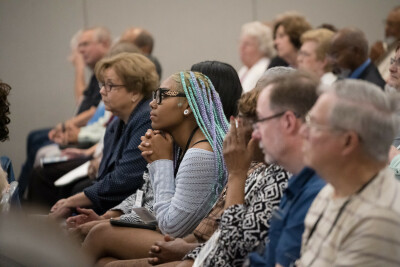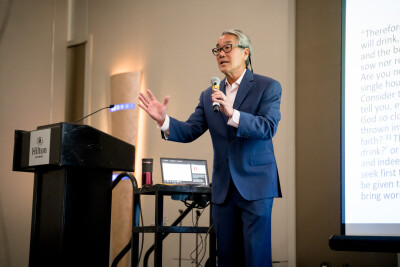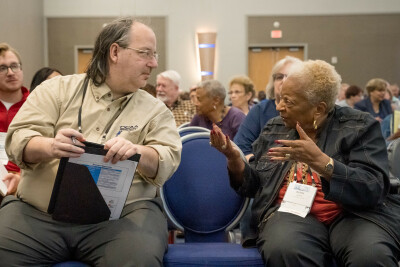Laity Session features lessons in leadership
By William Smith
Camp Chapel UMC
 While some of the more than 400 laypeople faced challenges in getting in and settled, once the hiccups were taken care of, the Laity Session of the 239th Baltimore-Washington Annual Conference delivered.
While some of the more than 400 laypeople faced challenges in getting in and settled, once the hiccups were taken care of, the Laity Session of the 239th Baltimore-Washington Annual Conference delivered.
Conference Lay Leader Deloris Martin opened the proceedings rejoicing that lay members were finally, after three years, “together in person and not looking at each other through a little screen.” She then gave thanks for Bishop Easterling, “bishop to all,” and to the conference staff and the district lay leaders for all their help and support.
The BWC Worship Team led the worship service that followed, focused on the message that despite what has been going on for the last few years, we are united in love, and we are yet alive. The meditations on the Scripture verses from the Gospel of John and the beautiful, soaring harmonies provided by the singers and musicians of the Worship Team set the tone for the day.
There were greetings from the United Women in Faith and the United Methodist Men, and Kim Walker introduced the most recent class of Certified Lay Ministers to enthusiastic applause.
 The keynote speaker was the Rev. Jack Shitama, author, blogger, speaker, teacher, coach, and director of the Center for Vital Leadership, whose topic was Living in an Age of Anxiety.
The keynote speaker was the Rev. Jack Shitama, author, blogger, speaker, teacher, coach, and director of the Center for Vital Leadership, whose topic was Living in an Age of Anxiety.
He explained that anxiety has been defined as “experiencing failure in advance,” and that we are currently living in an age of chronic anxiety in our families, in our congregations, and in our country. He paraphrased the words of Jesus in the Gospel of Matthew, saying that if we are worried, it’s because we are of little faith.
After a period of discussion in which small groups of two or three people shared with each other their experiences with the pervasive anxiety he had described, he called his audience back together to offer a way in which each individual could work to counteract its effects. The key, he said, is to become a self-differentiated leader who provides a non-anxious presence.
A self-differentiated leader is one who has the capacity to define her or his own beliefs or goals in the midst of the norms of the group they are functioning in, or what Rev. Shitama called “togetherness pressure.” He used as an example the statement, “This is how I believe God is leading us,” saying that people want to know what a leader believes, even if those beliefs are different from theirs, so long as the leader remains open to a different viewpoint; that is, so long as the leader listens to other ideas and is humble enough to acknowledge that he or she might be wrong. Another example he cited came from Dr. Martin Luther King’s “I Have a Dream” speech. Dr. King didn’t tell people what they had to do; instead, he challenged them to try.
However, Rev. Shitama cautioned, being a self-differentiated leader isn’t enough. One must also provide a non-anxious presence. The presence part is easy to understand, even if it’s not so easy to do: the leader needs to step up when leadership is required. The non-anxious part is more problematic, but it dovetails with self-differentiated leadership. It means giving others the freedom to disagree.
 There are three things every self-differentiated leader who provides a non-anxious presence does. First, they listen. Listening to someone vent their anxiety or anger tends to allow them to dissipate those negative emotions and lowers the anxiety level. Sometimes, listening is all that’s needed. Second, they remember that this type of leadership is a process. It’s not about the content of a particular situation, it’s the way the leader handles herself or himself in that situation. Third, they are emotionally connected, but not super serious about the situation. Like listening, being appropriately concerned – not too serious, but not too light either – helps to bring the anxiety level down.
There are three things every self-differentiated leader who provides a non-anxious presence does. First, they listen. Listening to someone vent their anxiety or anger tends to allow them to dissipate those negative emotions and lowers the anxiety level. Sometimes, listening is all that’s needed. Second, they remember that this type of leadership is a process. It’s not about the content of a particular situation, it’s the way the leader handles herself or himself in that situation. Third, they are emotionally connected, but not super serious about the situation. Like listening, being appropriately concerned – not too serious, but not too light either – helps to bring the anxiety level down.
Finally, Rev. Shitama granted that even self-differentiated leaders get anxious sometimes. They’re human beings. The things to avoid are passing one’s anxiety on to others or feeding it. In the end, the foundation of it all is the facilitating presence of God. With God’s help, all things are possible. Rev. Shitama ended the lecture portion of his presentation with a quotation from philosopher Søren Kierkegaard: “Now, Lord, with your help, I shall become myself,” before opening the floor for questions and closing the session with a prayer.
